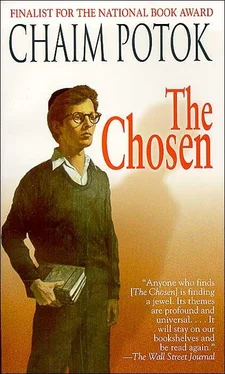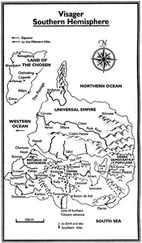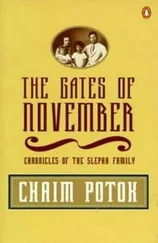Many great rabbis came to mock him and went away converted to his way of thinking. When he died, his followers opened their own synagogues. Before the end of that century, about half of eastern European Jewry consisted of Hasidim, as his followers were called, pious ones. So great was the need of the masses for a new way to approach God.'
'There was another man born in that century, Rabbi Elijah of Vilna, a great Talmudist, a genius, and a strong opponent of Hasidism. But even his opposition could not stop Hasidism from growing. It flourished and became a great movement in Jewish life. For a long time there was terrible bitterness between the Mitnagdim, the opponents of Hasidism, and the followers of the Besht. For example, if the son of a Hasid married the daughter of a Mitnaged, both fathers would say Kaddish after their children, considering them to be dead and buried. So great was the bitterness.'
'The Hasidim had great leaders – tzaddikim, they were called, righteous ones. Each Hasidic community had its own tzaddik, and his people would go to him with all their problems, and he would give them advice. They followed these leaders blindly. The Hasidim believed that the tzaddik was a superhuman link between themselves and God. Every act of his and every word he spoke was holy. Even the food he touched became holy. For example, they would grab the food scraps he left on his plate and eat them, because the food had become holy through his touch, and they wanted some of this holiness inside themselves. For a while, the tzaddikim were kind and gentle souls, like the Besht himself. But in the next century the movement began to degenerate. Many of the positions of tzaddik became inherited posts, going automatically from father to son, even if the son was not a great leader. Many tzaddikim lived like Oriental monarchs. Some of them were out-and-out frauds, and they exploited their people terribly. Others were very sincere, and a few were even great scholars of the Talmud. In some Hasidic sects, the study of the Talmud became as important as it had been before the time of the Besht. Secular literature was forbidden, and the Hasidim lived shut off from the rest of the world. Anything that was not Jewish and Hasidic was forbidden. Their lives became frozen.
The clothes they wear today, for example, are the same Polish style clothes they wore hundreds of years ago. Their customs and beliefs are also the same as they were hundreds of years ago. But not all of the Hasidic communities are identical, Reuven. The Hasidim of Russia, Germany, Poland, and Hungary are different one from the other. Not very different, but they are different. There are even Hasidic groups that believe their leaders should take upon themselves the sufferings of the Jewish people. You are surprised? But it is true. They believe that their sufferings would be unendurable if their leaders did not somehow absorb these sufferings into themselves. A strange belief, but a very important one, as far as they are concerned.'
'Reuven, Reb Saunders is a great Talmudist and a great tzaddik. He has a reputation for brilliance and compassion. It is said that he believes the soul is as important as the mind, if not more so. He inherited his position from his father. When he dies, the position will go automatically to Danny.'
My father stopped, looked at me with a smile, and said, 'You are not asleep yet, Reuven?'
'No, abba.'
'You are a very patient student. I think I am going to have another glass of tea. My throat is a little dry.'
I took his glass, poured into it some strong-brewed tea from the teapot, filled it with water from the kettle, then brought it back to him. He put a cube of sugar between his teeth and sipped slowly from the glass, letting the tea soak through the sugar. Then he put the glass down.
'Tea is a blessing,' he said, smiling. 'Especially to a schoolteacher who must always give long answers to short questions.'
I smiled back at him and waited patiently.
'All right,' my father said. 'I see you want me to continue.
Now I am going to tell you another story, also a true story, about a Jewish boy who lived in Poland in the second half of the eighteenth century. As I tell you the story, think of Reb Saunders' son, and you will have your answer.
'This boy, Reuven, was brilliant, literally a genius. His name was Solomon, and later in life he changed his long Polish name to Maimon. When he was young, he found that the Talmud could not satisfy his hunger for knowledge. His mind would not let him rest. He wanted to know what was happening in the outside world. German was by then a great scientific and cultural language, and he decided to teach himself to read German. But even after he learned German he was not satisfied, because the reading of secular books was forbidden. Finally, at the age of twenty-five, he abandoned his wife and child and after many hardships came to Berlin where he joined a group of philosophers, read Aristotle, Maimonides, Spinoza, Leibniz, Hume, and Kant, and began to write philosophical books. It is astonishing how he was able to gobble up complicated philosophical treatises with such ease. He had a great mind, but it never left him in peace. He wandered from city to city, never finding roots anywhere, never satisfied, and finally died at forty-seven on the estate of a kind-hearted Christian who had befriended him.
'Reuven, Reb Saunders' son has a mind like Solomon Maimon's, perhaps even a greater' mind. And Reb Saunders' son does not live in Poland. America is free. There are no walls here to hold back the Jews. Is it so strange, then, that he is breaking his father's rules and reading forbidden books? He cannot help himself. It is unbelievable what he has read these past few months. You are a brilliant student. I tell you that now very proudly. But he is a phenomenon. Once in a generation is a mind like that born.
'Now, Reuven, listen very carefully to what I am going to tell you. Reb Saunders' son is a terribly torn and lonely boy. There is literally no one in the world he can talk to. He needs a friend. The accident with the baseball has bound him to you, and he has already sensed in you someone he can talk to without fear. I am very proud of you for that. He would never have told you about his library visits if he believed for a moment you would not keep his words a secret trust. And I want you to let him be your friend and to let yourself be his friend. I am certain you and Reb Saunders' son can help each other in such a friendship. I know you, and I know him. And I know what I am saying. And now, Reuven, the lecture is over, I am going to finish my tea, and we will go to bed. What a lecture it has been! Do you want some tea?'
'No, abba.'
We sat in silence, while my father sipped from his glass.
'You are very quiet,' he said finally.
'It all started with a silly baseball game,' I said. 'I can't believe it.'
'Reuven, as you grow older you will discover that the most important things that will happen to you will often come as a result of silly things, as you call them – "ordinary things" is a better expression. That is the way the world is.'
I shook my head. 'I just can't believe it,' I said again. 'This whole week has been like something from another world. The hospital, the people I met there, Mr Savo, little Mickey, Billy all because of a ball game.'
My father sipped his tea and looked at me over the rim of the glass. He said nothing, but he was watching me intently.
'I don't understand it,' I said. 'Weeks and weeks go by, one Shabbat follows another, and I'm the same, nothing has changed, and suddenly one day something happens, and everything looks different.'
'Different? What do you mean, different?'
I told him how I had felt that afternoon when I had come home from the hospital. He listened quietly, all the while sipping his tea. When I finished, I saw him smile. He put down the glass, sighed, and stopped, his voice breaking. He was quiet for a moment. Then he looked at the clock on the shelf over the refrigerator. 'It is very late,' he said; 'We will talk some more tomorrow.'
Читать дальше












